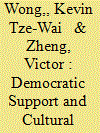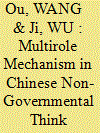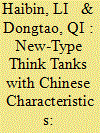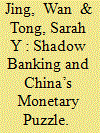| Srl | Item |
| 1 |
ID:
161205


|
|
|
|
|
| Summary/Abstract |
Although the Chinese government has mobilised the world’s largest number of youth participants in various civic service programmes since 1949, evidence indicates that the programmes remain far from achieving their goals. To examine the challenges of and options for implementing state-led youth civic services in China, this article begins with a literature review and later describes a study that involved the application of qualitative methods to explore structural features that have affected the implementation of state-led civic service programmes in China, including “Graduates Voluntarily Serving in Western China” (Daxuesheng zhiyuan fuwu xibu), “Graduates Serving as Village Officers” (Daxuesheng cunguan) and “Graduates Engaging in Teaching, Agriculture, and Health and Poverty Alleviation in Rural Areas” (San zhi yi fu). The findings indicate a boundary between state power and the market order that, as a structural factor, limits the number and types of institutions that may host youth in state-led civic service programmes in China. In response, China’s state-led civic service programmes should not limit themselves to the public sector but invite the third sector to participate in order to overcome state–market barriers. Moreover, at the policy level, a win-win situation is possible if the central government delegates the hiring power to the local government and host institutions.
|
|
|
|
|
|
|
|
|
|
|
|
|
|
|
|
| 2 |
ID:
161198


|
|
|
|
|
| Summary/Abstract |
China has experienced a nationwide boom in think tank construction in recent years. This article attempts to explain the central government’s rationale for promoting the construction of “new type” of think tanks with Chinese characteristics and to shed light on the so-called new features of these think tanks. In addition, studying the reasons why intellectuals participate actively in the think tank construction and whether new think tanks can provide the scientific decision-making that the central government has expected are central to scholars’ and observers’ understanding of China’s ongoing think tank fever. The author finds that the new think tanks are not any different from the traditional ones in China. If the general political environment does not change, China’s think tank construction will face a questionable future.
|
|
|
|
|
|
|
|
|
|
|
|
|
|
|
|
| 3 |
ID:
161199


|
|
|
|
|
| Summary/Abstract |
A think tank development fever promoted by the Chinese government has proliferated in China since late 2012. This study reviews Xi Jinping’s promotion of think tanks, discusses the different definitions and unique characteristics of Chinese think tanks, and then compares China’s think tank system with America’s in order to understand their key differences. The analysis shows that four sectors, namely the government, businesses, universities and media, have played different roles in developing think tanks in recent years. Also discussed are the limiting effects of China’s government-driven top-down mobilisation on think tank development.
|
|
|
|
|
|
|
|
|
|
|
|
|
|
|
|
| 4 |
ID:
161204


|
|
|
|
|
| Summary/Abstract |
This article examines the possible negative impacts of two East Asian traditional values—the notion of paternalistic meritocracy and the instrumental perception of ideal political arrangements—on popular support for democracy in Hong Kong and East Asian societies. Based on data drawn from various surveys, East Asians are found to be quite attached to paternalistic meritocracy and democratic instrumentalism. Comparatively, Hong Kong people are less inclined to perceive democracy in a procedural way although they are less attached to paternalistic meritocracy. Regression analysis demonstrates a negative correlation between these two values, with a preference for democracy.
|
|
|
|
|
|
|
|
|
|
|
|
|
|
|
|
| 5 |
ID:
161201


|
|
|
|
|
| Summary/Abstract |
This article contextualises China’s university think tanks in the history of higher education reforms and proposes that the development of university think tanks is the country’s third attempt of institutional reforms in research. One of the goals of the reform is to rebalance the relationship between government power and knowledge producers. In light of the power–knowledge theory, this article utilises university think tanks in Shanghai as a case to assess how well China’s new-type university think tanks have achieved the goal of rebalancing power–knowledge relations. Findings have shown that resource allocation and interaction mechanism are the two main factors influencing power–knowledge relations.
|
|
|
|
|
|
|
|
|
|
|
|
|
|
|
|
| 6 |
ID:
161200


|
|
|
|
|
| Summary/Abstract |
With the rapid pace of globalisation, the internationalisation of think tanks (ITT) has been a growing concern. ITT can manifest in a myriad of ways, such as employing foreign staff, setting up overseas branches and forging cooperation with other countries’ think tanks. Despite the research community’s awareness of the development, there is no systematic analysis of ITT in the current literature. This article develops a “personnel-centred model” to investigate the internationalisation behaviours of think tanks. This conceptual framework attempts to explain the difficulties faced by China’s think tanks in the process of internationalisation. The authors also propose several possible solutions to assist Chinese think tanks resolve the difficulties.
|
|
|
|
|
|
|
|
|
|
|
|
|
|
|
|
| 7 |
ID:
161207


|
|
|
|
|
| Summary/Abstract |
This study tests the causal relationship between financial development and economic growth in China applying the bootstrap rolling-window approach. The results show that economic growth has positive effects on financial development and that financial development exerts negative effects on economic growth. Economic growth promotes financial development, indicating the existence of a “demand-following” link. For a developing and repressed economy, it is critical to establish well-developed financial systems, particularly with sound financial intermediation and a liberalised interest rate, all of which promote financial innovation and improvement. It should be noted that a rational and steady relationship between financial development and economic growth is essential for China’s economic prosperity.
|
|
|
|
|
|
|
|
|
|
|
|
|
|
|
|
| 8 |
ID:
161202


|
|
|
|
|
| Summary/Abstract |
This article uses the China Institute for Reform and Development (CIRD) in Hainan as a think tank case study of the multirole mechanism that has enabled it to operate effectively in formulating policy issues and influencing policies. This multirole mechanism is comparable to the “revolving door” in the United States but has a different structure and operation mode. This article ascribes these differences to the two countries’ contrasting political systems, polities and personnel systems, and highlights that the experiences of think tank operation are closely related to the political system background .
|
|
|
|
|
|
|
|
|
|
|
|
|
|
|
|
| 9 |
ID:
161196


|
|
|
| 10 |
ID:
161206


|
|
|
|
|
| Summary/Abstract |
There are two monetary puzzles in post-2008 China—the money multiplier had risen considerably in magnitude and the rapidly expanding money supply, M2, has not led to a surge in consumer price index (CPI). To untangle the puzzles, the authors relaxed some of the assumptions in the conventional quantity theory of money (QTM) and introduced endogeneity into the money multiplier, taking into account the rapid expansion of shadow banking. This unveils a mechanism that links monetary authority and credit allocation among sectors. An important policy implication is that controlling the relative size of shadow banking can help improve the effectiveness of China’s monetary policies.
|
|
|
|
|
|
|
|
|
|
|
|
|
|
|
|